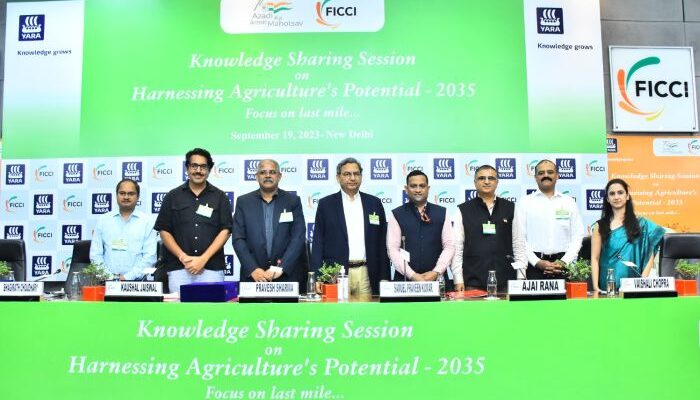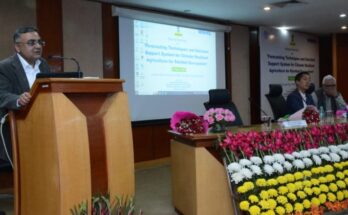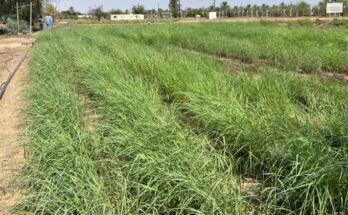It is imperative to adopt technology and create infrastructure to build a resilient agricultural value chain, Samuel Praveen Kumar, Joint Secretary (Extension), Ministry of Agriculture and Farmers’ Welfare, Govt of India today said in New Delhi.
Addressing the knowledge sharing session ‘Harnessing Agriculture’s Potential- 2035’, organised by FICCI, Kumar said that earlier the government had a production-centric approach in the agriculture sector but now we focus on the entire value chain. Every country across the world is embracing newer technologies, following innovative ways to build a strong agricultural value chain. “By adopting these measures along with the collective efforts of all stakeholders, we can make Indian agriculture sector more robust, resilient, and climate-smart to match the global standards,” he added.
To promote infrastructure in the agriculture sector, he said that the government introduced the Agriculture Infrastructure Fund (AIF) scheme in 2020. “To date, close to Rs 30,000 crore has been disbursed for these projects and this in turn has brought in investments around Rs 50,500 crore. This is going to change the landscape of the agriculture sector in the country as it is through infrastructure only that we can address the other inefficiencies in the supply chain,” he added.
You may also like to read – Emerging technologies and precision farming SaaS to design future landscape for agriculture
Speaking on the issue of institutional credit for farmers, the Joint Secretary said that it is one of the focus areas of the government. “A robust value chain would ensure that the loss suffered by a farmer should be minimal and evitable including farm or operational loss,” said Kumar.
He said that technology penetration in the agriculture sector is least as compared to other sectors like education and health and there is scope to further enhance technological adoption through Artificial Intelligence (AI), Machine Learning (ML) and Deep Learning. “The Ministry is using these technology tools to develop a few applications including capturing innovations at the farm level, digital crop survey along with creating the agri-stack,” emphasised Kumar.
Speaking at the occasion, Sanjiv Kanwar, Managing Director, Yara South Asia said, “The agri-channels who have been in this space for over 50 years are the original startups of Indian agriculture. They believed in the future of Indian agriculture and committed themselves to making India self-sufficient by serving farmers with the right agri inputs and technology support. Channel partners must be recognised for providing the last-mile connectivity from lab to land. Through this knowledge-sharing session, I congratulate all the channel partners for their commitment and consistency in serving rural India for over the past five decades. Their contribution to the nation’s agricultural growth has been highly appreciable. They have conducted business with a strong sense of purpose serving farmers through the thick and thin over several years to become successful and profit making.”
You may also like to read – Tech adoption is key to sustainable regenerative farming
Siraj Hussain, Advisor, FICCI and Former Secretary, Ministry of Agriculture & Farmers Welfare and Ministry of Food Processing Industries, Govt of India said, “FICCI is thrilled to have partnered with Yara India for this knowledge-sharing event, ‘Harnessing Agriculture’s Potential – 2035’. This partnership opens doors to explore the needs of input dealers and channel partners. They play an important role in communicating to farmers the advancements in the use of inputs. They enable robust relationships between Indian farmers and emerging scientific technologies.”
Ajai Rana, CEO, Savannah Seeds said that we can improve our farm production by utilising high-quality seeds, proper crop nutrition, and efficient mechanisation in the farming process.
Kaushal Jaiswal, Co-Chairman, FICCI National Agriculture Committee and MD, Rivulis Irrigation India said with so much potential in the agriculture sector, it becomes imperative that the Agri channel partners are suitably identified, supported and handheld so as to mainstream them for the long run.
You may also like to read – Maximising Kharif Crop Yields: The Role of Crop Protection & Nutrition in Sustainable Cultivation
Speaking on the reducing cost of cultivation, Jaiswal said, “While drip irrigation makes efficient consumption of water; through fertigation, it also brings 96 per cent fertiliser use efficiency as compared to 30 per cent in conventional method. As drip irrigation only irrigates the plants and not the entire field, the field doesn’t develop weeds which saves expenditure on herbicides and manual labour. And therefore, it saves cost on water, fertilisers, agrochemicals and human labour.”
Deepak Verma, Domain Lead- Agriculture, Open Network for Digital Commerce (ONDC) said that ONDC brings all technology providers on one platform to provide unified e-commerce solutions to the end users. “The innovative technology provides cross-platform e-commerce services. A buyer can purchase the commodity from other e-commerce platforms from a single platform by linking cross-platform buyers and sellers,” Verma added.
Arvind Chaudhary, Director General, Fertiliser Association of India (FAI) said that there is a need to create awareness about the judicious use of fertilisers in farming. “It is important to conduct soil testing in order to determine the appropriate amount and type of fertilisers needed for optimal crop growth,” he added.





